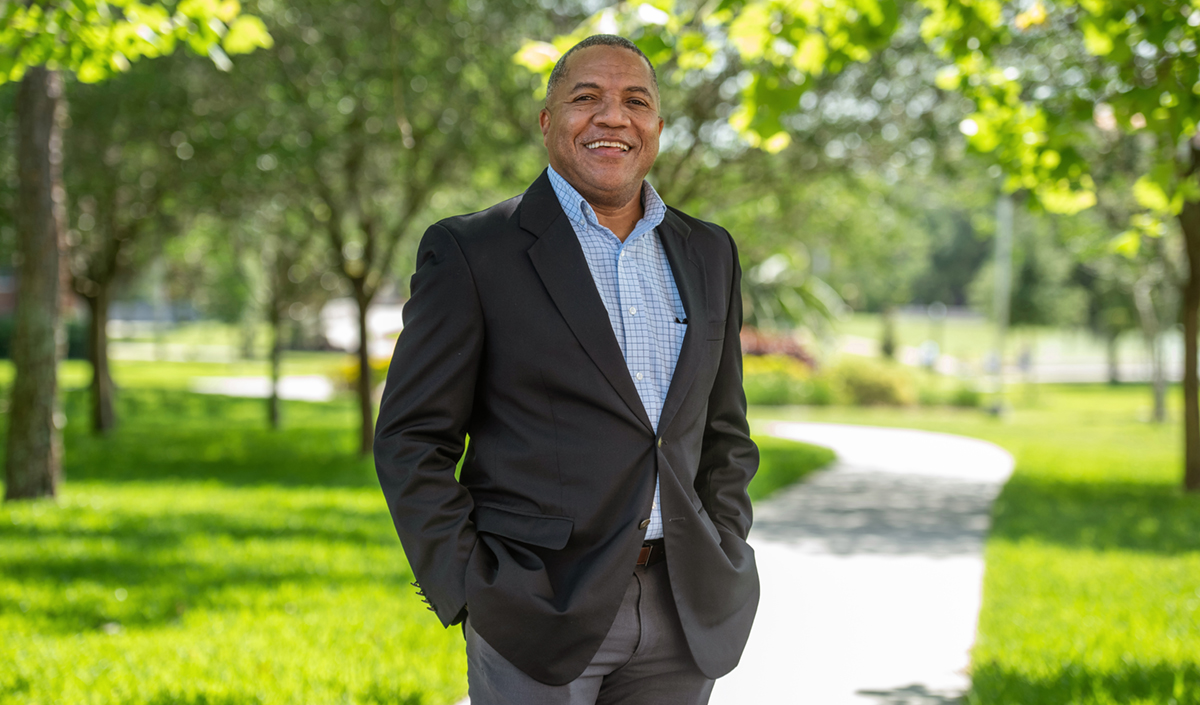The director of UCF’s School of Teacher Education reflects on the rewards and challenges of teaching.

Malcolm Butler wanted to be a physicist, and he wanted to win a Nobel Prize. While pursuing his doctorate in physics, Butler began working at an afterschool program, and this experience planted a seed about the possibility of teaching young people for a living. “I was at this Rubicon in my life where I was figuring out what I wanted to do,” says Butler. “Rather than becoming a scientist, I realized I could help grow future scientists.”
He changed his doctoral focus to curriculum and instruction and set out on his new path: being a teacher.
After teaching middle and high school students for three years, he transitioned into higher education. Now, Butler is the director of the College of Community Innovation and Education’s School of Teacher Education and a professor of science education. He’s also part of UCF’s Learning Sciences Cluster.
“I’ve taught every age from five-years-old to doctoral students,” says Butler, who still likes to visit K-12 schools and connect with students. “I am a teacher and researcher at heart.”
From your perspective, how has the education landscape changed over the years?
We’re preparing children for a world that we don't know yet. Within a generation, we experience changes rapidly, and it’s something that’s happening more and more. For example, emails were a main source of communication in the 90s and now it’s texting. The beauty of learning and teaching is that you're able to help students confront their own realities in a way that's helping them to think about these realities. I don't have to convince students whether or not climate change is real. I can teach them the science and show them the evolution over time. I can provide them with the space to figure it out on their own, give them the skill set to be incredulous, and then give them opportunities to draw their own conclusions. The onus is on us to help students craft their reality and give them the tools to think about it.
How has the pandemic affected education?
If this pandemic has taught us anything, it's shone a very bright light on the importance of teachers and the role they play. The media are talking about the learning loss that children have experienced. What I think needs to be a part of the equation when we're having these conversations is to realize that in the midst of the pandemic and virtual learning, kids have learned a lot — it just might not be what we expected them to learn. It's important for us as educators to acknowledge and create, even during this learning loss, a space for students to show us what they learned. Then, we need to figure out how we can weave that into the conversation.
What do you think is critical to being a good teacher?
A big part of teaching and education is the humane part. When I first started teaching, I remember introducing myself at a faculty meeting. I said, ‘I teach physics.’ The English teacher said, ‘I teach young people English.’ I went over to her after the meeting and commented on her way of describing her job. She said, ‘I say that to remind myself that I teach people first, and then I teach the content.’
We should always remember that students are people first. They are learners first, and we have to connect with them before real learning can take place. We have to start with the humanity part — that’s such a critical component of what teachers and educators do. Education means to bring forth, to bring out of someone. It means that students already have something in them. Our job, the heavy lifting, is figuring how to tie what they have to what we need to teach them. That's the hard work, but it can also be the fun part.
And learning isn’t linear, but that's how we test and how we have the whole school year structured. We need structure, but learning doesn't necessarily happen that way. Students go backwards and sideways. We're holding teachers accountable for this linear learning, even though we know it’s not reality. We need to at least acknowledge that teachers are working with students who may not learn according to the structured timeframe.
What’s the challenging part of being a teacher?
I came across a quote from Todd Whitaker last year. He said, ‘The best thing about teaching is that it matters. The most difficult thing about teaching is that it matters every single day.’ If there's a secret sauce, it’s realizing that every single day you have the opportunity to potentially change the trajectory of somebody's life. You could be the person that says something or does something that keeps a student in school and puts them on a positive path. You could also remind them why learning is so valuable and why we're indeed all lifelong learners.
What’s the most rewarding aspect of teaching?
When you see that proverbial lightbulb go off! I don't think there's any amount of money that can replace the feeling when someone says, “I got it.” There's nothing like it. To hear a student say, “I did it!” or “I aced the test!” or “I was accepted into college!” or “I can't wait to start being a pipe fitter.” I think that is the highest reward for a teacher.